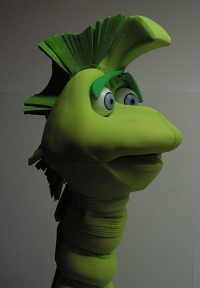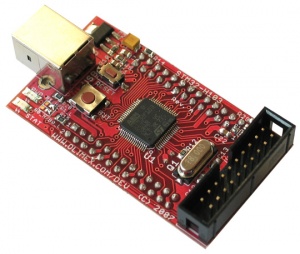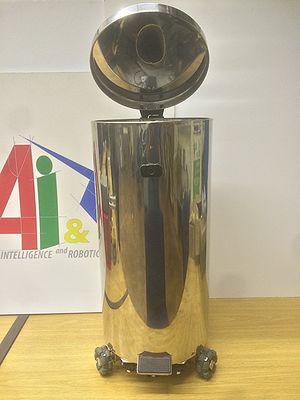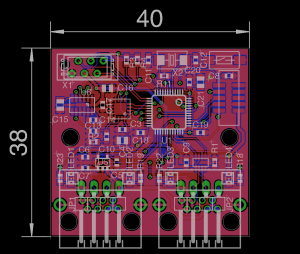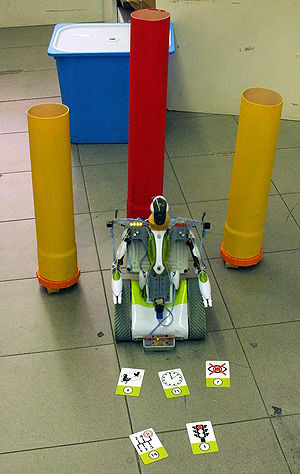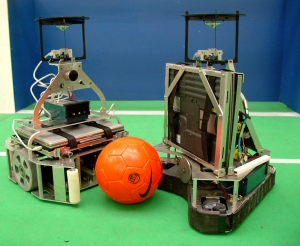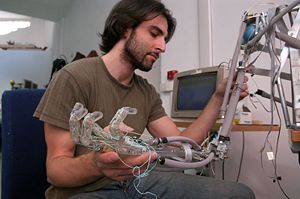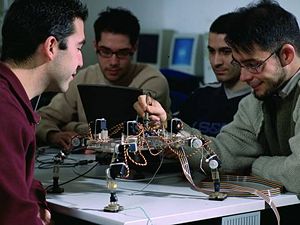Difference between revisions of "First Level Course Projects"
m |
m |
||
| (74 intermediate revisions by 9 users not shown) | |||
| Line 1: | Line 1: | ||
| − | Here you can find a list of project proposals for the courses of "Progetto di Ingegneria Informatica" and "Progetto di Robotica" (5 CFU for each student) | + | Here you can find a list of project proposals for the courses of "Progetto di Ingegneria Informatica" and "Progetto di Robotica" (5 CFU for each student). See [[Project Proposals]] for other kinds of projects and theses. |
| + | <!--==== Agents, Multiagent Systems, Agencies ==== | ||
| + | --> | ||
| + | <!--==== BioSignal Analysis ==== | ||
| − | + | ===== Brain-Computer Interface ===== | |
| − | + | {{#ask: [[Category:ProjectProposal]] | |
| − | + | [[PrjResArea::BioSignal Analysis]] | |
| − | + | [[PrjResTopic::Brain-Computer Interface]] | |
| − | {{ | + | [[PrjLevel::Bs]] |
| − | + | [[PrjType::Course]] | | |
| − | + | ?PrjTitle | | |
| − | + | ?PrjImage | | |
| − | + | ?PrjDescription | | |
| − | + | ?PrjTutor | | |
| − | + | ?PrjStarts | | |
| − | + | ?PrjStudMin | | |
| − | + | ?PrjStudMax | | |
| − | + | ?PrjCFUMin | | |
| − | + | ?PrjCFUMax | | |
| − | + | ?PrjResArea | | |
| − | + | ?PrjResTopic | | |
| − | + | format = template | | |
| − | + | template = Template:ProjectProposalViz | |
| − | + | }} | |
| − | + | --> | |
| − | | | + | <!--==== Affective Computing ==== |
| − | | | + | --> |
| − | | | + | <!--==== Computer Vision and Image Analysis ==== |
| − | | | + | |
| − | + | ||
| − | + | ||
| − | + | ||
| − | | | + | |
| − | | | + | |
| − | | | + | |
| − | + | ||
| − | + | ||
| − | + | ||
| − | + | ||
| − | + | ||
| − | + | ||
| − | + | ||
| − | + | ||
| − | + | ||
| − | + | ||
| − | + | ||
| − | + | ||
| − | + | ||
| − | | | + | |
| − | | | + | |
| − | | | + | |
| − | + | ||
| − | + | ||
| − | + | ||
| − | + | ||
| − | | | + | |
| − | + | ||
| − | + | ||
| − | + | ||
| − | + | ||
| − | + | ||
| − | + | ||
| − | + | ||
| − | + | ||
| − | + | ||
| − | + | ||
| − | + | ||
| − | + | ||
| − | + | ||
| − | + | ||
| − | + | ||
| − | + | ||
| − | + | ||
| − | + | ||
| − | + | ||
| − | + | ||
| − | + | ||
| − | + | ||
| − | + | ||
| − | + | ||
| − | + | ||
| − | + | ||
| − | + | ||
| − | + | ||
| − | + | ||
| − | + | ||
| − | + | ||
| − | + | ||
| − | + | ||
| − | + | ||
| − | + | ||
| − | + | ||
| − | + | ||
| − | + | ||
| − | + | ||
| − | + | ||
| − | + | ||
| − | + | ||
| − | + | ||
| − | + | ||
| − | + | ||
| − | + | ||
| − | + | ||
| − | + | ||
| − | + | ||
| − | + | ||
| − | + | ||
| − | + | ||
| − | ==== Computer Vision and Image Analysis ==== | + | |
{{Project template | {{Project template | ||
| Line 121: | Line 43: | ||
|image=Danch4.png | |image=Danch4.png | ||
}} | }} | ||
| + | --> | ||
| − | <!--==== E-Science ==== | + | <!--==== E-Science ==== |
| − | + | --> | |
| − | + | ||
| − | + | ||
| + | <!--==== Computational Intelligence and Games ==== | ||
| + | |||
| + | {{#ask: [[Category:ProjectProposal]] | ||
| + | [[PrjResTopic::Computational Intelligence and Games]] | ||
| + | [[PrjLevel::Bs]] | ||
| + | [[PrjType::Course]] | | ||
| + | ?PrjTitle | | ||
| + | ?PrjImage | | ||
| + | ?PrjDescription | | ||
| + | ?PrjTutor | | ||
| + | ?PrjStarts | | ||
| + | ?PrjStudMin | | ||
| + | ?PrjStudMax | | ||
| + | ?PrjCFUMin | | ||
| + | ?PrjCFUMax | | ||
| + | ?PrjResArea | | ||
| + | ?PrjResTopic | | ||
| + | format = template | | ||
| + | template = Template:ProjectProposalViz | ||
| + | }} | ||
| + | --> | ||
| + | <!--==== Social Software and Semantic Web ==== | ||
| + | --> | ||
| + | <!-- ===== Social Network Analysis ===== | ||
| + | |||
| + | {{#ask: [[Category:ProjectProposal]] | ||
| + | [[PrjLevel::Bs]] | ||
| + | [[PrjType::Course]] | ||
| + | [[PrjResArea::Social Software and Semantic Web]] | | ||
| + | [[PrjResTopic::Social Network Analysis]] | | ||
| + | ?PrjTitle | | ||
| + | ?PrjImage | | ||
| + | ?PrjDescription | | ||
| + | ?PrjTutor | | ||
| + | ?PrjStarts | | ||
| + | ?PrjStudMin | | ||
| + | ?PrjStudMax | | ||
| + | ?PrjCFUMin | | ||
| + | ?PrjCFUMax | | ||
| + | ?PrjResArea | | ||
| + | ?PrjResTopic | | ||
| + | format = template | | ||
| + | template = Template:ProjectProposalViz | ||
| + | }} | ||
| + | --> | ||
| + | <!--==== Philosophy of Artificial Intelligence ==== | ||
| + | --> | ||
| + | <!--==== Machine Learning ==== | ||
| + | {{#ask: [[Category:ProjectProposal]] | ||
| + | [[PrjResArea::Machine Learning]] | ||
| + | [[PrjLevel::Bs]] | ||
| + | [[PrjType::Course]] | | ||
| + | ?PrjTitle | | ||
| + | ?PrjImage | | ||
| + | ?PrjDescription | | ||
| + | ?PrjTutor | | ||
| + | ?PrjStarts | | ||
| + | ?PrjStudMin | | ||
| + | ?PrjStudMax | | ||
| + | ?PrjCFUMin | | ||
| + | ?PrjCFUMax | | ||
| + | ?PrjResArea | | ||
| + | ?PrjResTopic | | ||
| + | format = template | | ||
| + | template = Template:ProjectProposalViz | ||
| + | }} | ||
| + | --> | ||
==== Robotics ==== | ==== Robotics ==== | ||
| − | {{Project template | + | |
| + | {{#ask: [[Category:ProjectProposal]] | ||
| + | [[PrjResArea::Robotics]] | ||
| + | [[PrjLevel::Bs]] | ||
| + | [[PrjType::Course]] | | ||
| + | ?PrjTitle | | ||
| + | ?PrjImage | | ||
| + | ?PrjDescription | | ||
| + | ?PrjTutor | | ||
| + | ?PrjStarts | | ||
| + | ?PrjStudMin | | ||
| + | ?PrjStudMax | | ||
| + | ?PrjCFUMin | | ||
| + | ?PrjCFUMax | | ||
| + | ?PrjResArea | | ||
| + | ?PrjResTopic | | ||
| + | format = template | | ||
| + | template = Template:ProjectProposalViz | ||
| + | }} | ||
| + | |||
| + | |||
| + | <!--{{Project template | ||
|title=Simulation of 6-DOF Robot Manipulator | |title=Simulation of 6-DOF Robot Manipulator | ||
|tutor=Marcello Restelli (restelli-AT-elet-DOT-polimi-DOT-it) | |tutor=Marcello Restelli (restelli-AT-elet-DOT-polimi-DOT-it) | ||
| Line 147: | Line 156: | ||
{{Project template | {{Project template | ||
| − | |title= | + | |title=Calibration of IMU-camera system |
| − | |tutor= | + | |tutor=[[User:MatteoMatteucci|Matteo Matteucci]], [[User:DavideMigliore|Davide Migliore]] |
| − | |description= | + | |description=This work is about the problem to calibrate a system composed by an XSense |
| − | + | Inertial Measurement Unit and a Fire-i Camera. The pro ject will be focus on | |
| − | + | the problem to estimate both unknown rotation between the two devices and the | |
| − | + | extrinsic/intrinsic parameters of the camera. This algorithm allows to use the | |
| − | + | system for SLAM or robotics applications, like a wereable device for autonomous | |
| − | + | navigation or augmented reality. | |
| − | + | ;Tools and instruments | |
| + | :Matlab/C++ | ||
| + | |||
| + | ;Links | ||
| + | :Matlab Toolbox for mutual calibration [http://www.deec.uc.pt/~jlobo/InerVis_WebIndex/InerVis_Toolbox.html] | ||
| + | :List of pubblications[http://www.deec.uc.pt/~jlobo/InerVis_WebIndex/InerVis_Pubs.php] | ||
| − | |||
|start=Anytime | |start=Anytime | ||
| − | |number=1 | + | |number=1 |
| − | |cfu=5- | + | |cfu=5-20 |
| − | |image= | + | |image=Imu_cam_big_sphere.gif}} |
| + | --> | ||
{{Project template | {{Project template | ||
| − | |title= | + | |title=Humanoid robotics |
| − | |tutor= | + | |tutor=Giuseppina Gini(gini-AT-elet-DOT-polimi-DOT-it) |
| − | |description= | + | |description=this project is about developing various functions of humanoids, in particular related to sensing and cognition for manipulation. Possible specific projects are: |
| − | + | * BIOINSPIRED ROBOT HEAD FOR VISION - design and build a robot head able to host 2 cameras with 2dof of freedom each to create a human-like vision system. The movements can be obtained using 4 McKibben actuators for each camera, or electric actuators. | |
| − | * | + | * NEW HARDWARE FOR MAXIMUMOne - the humanoid robot is moved by more than 20 actuators and needs input from all of them. The new architecture FPGA based will move the arm and the head. |
| − | * | + | * SIMULATOR OF HUMANOID ROBOT - complete the simulator of MaximumOne with all the dof. The simulator will use the same Matlab algorithms of the controller. |
| − | * | + | * INTEGRATING MANIPULATION AND VISION ON MAXIMUMOne - develop a natural vision system that uses the neck and the eyes movements to follow objects and to concentrate on grasping targets. The integration can be done in matlab/Simulink and integrated in the MaximumOne model. |
| − | * | + | * PATH PLANNING AND COLLISION AVOIDANCE IN OOPS - Randomized path planning is a strategy to produce paths for complex devices. An open source project (OOPS) is available; the project is about integrating path planning with a robot simulator. |
| − | + | All the projects can be turned into a thesis. | |
| − | + | ||
| − | + | ||
|start=Anytime | |start=Anytime | ||
| − | |number= | + | |number=4-5 |
| − | |cfu=5- | + | |cfu=5-20 |
| − | |image= | + | |image=maximum.jpg}} |
| − | + | {{Project template | |
| + | |title=Legged locomotion | ||
| + | |tutor=[[User:GiuseppinaGini|Giuseppina Gini]] ([mailto:gini%40%65%6c%65%74%2e%70%6f%6c%69%6d%69%2e%69%74 email]) | ||
| + | |description= The proposed projects in the area of walking robots will improve the performances of on-going systems. | ||
| + | * KINEMATIC/DYNAMIC MODEL OF WARUGADAR - develop a complete kinematic analysis of a quadruped robot, useful for planning the foot position on uneven terrains. The dynamic model will be useful for learning different gaits. | ||
| + | * GAIT GENERATION AND CONTROL FOR WARUGADAR - Study Central Pattern Generation, develop a CPG implementation in Matlab or Python. Adapt the method to a quadruped robot (Warugadar). | ||
| + | * ROBO FISH - Continue the development of hardware and software for the robotic fish Zoidberg2, and study a fish colony. | ||
| + | * EMBOT WALKING - complete the robot with 4 wheels used as feet. Control it and experiment. | ||
| + | * ROBOTIC EXPERIMENTS WITH BIOLOID - using Bioloid experiments hw and gaits, develop software for the humanoid challenges at ICRA2010. | ||
| + | |||
| + | All the projects can be turned into a thesis. | ||
| + | |start=Anytime | ||
| + | |number=2-5 | ||
| + | |cfu=5-20 | ||
| + | |image=leg.jpg}} | ||
Latest revision as of 16:20, 3 October 2011
Here you can find a list of project proposals for the courses of "Progetto di Ingegneria Informatica" and "Progetto di Robotica" (5 CFU for each student). See Project Proposals for other kinds of projects and theses.
Robotics
| Wiki Page: | BringMeHome | |
| Title: | BringMeHome | |
| Description: | ||
| Tutor: | [[AndreaBonarini | ]] (, , , , , , , , , , , , , , , , , , … further resultswarning.png
| |
| Start: | 30 March 2013 | |
| Students: | 1 - 2 | |
| CFU: | 2 - 20 | |
| Research Area: | Robotics | |
| Research Topic: | E-2? - A robot for exhibitions |
| Wiki Page: | CAN Bus bootloader for STM32 microcontrollers | |
| Title: | CAN Bus bootloader for STM32 microcontrollers | |
| Description: | JOINT PROJECT with the Embedded Systems group (contact: Patrick Bellasi http://home.dei.polimi.it/bellasi/)
In order to speed up the development and the maintenance of embedded applications, a way to update the firmware on a microcontroller without the need of connecting cables or programmers can be very handy. We are developing a framework for rapid prototyping of low-cost robots, with smart devices that exchange data on a CAN bus network. The CAN bus bootloader is one of the components we need for this project, enabling remote firmware upgrades of all the devices connected to the CAN network. This project aims to develop a CAN bus bootloader for STM32 ARM Cortex-M3 microcontrollers, and eventually for other architectures. | |
| Tutor: | [[AndreaBonarini | ]] (, , , , , , , , , , , , , , , , , , … further resultswarning.png
| |
| Start: | 1 March 2012 | |
| Students: | 1 - 2 | |
| CFU: | 2 - 5 | |
| Research Area: | Robotics | |
| Research Topic: | Robot development |
| Wiki Page: | Designing Living Objects | |
| Title: | Designing Living Objects | |
| Description: | The aim of this activity is to investigate how one or more objects in an antropic environment (home, office, hospital) can be designed and implemented to have a character and to move, having nice interactions with people. The work to be done concerns the analysis, definition, design and implementation of at least one of these objects. | |
| Tutor: | [[AndreaBonarini | ]] (, , , , , , , , , , , , , , , , , , … further resultswarning.png
| |
| Start: | 15 October 2017 | |
| Students: | 1 - 2 | |
| CFU: | 5 - 20 | |
| Research Area: | Robotics | |
| Research Topic: | Living Objects |
| Wiki Page: | Embedded registers view plug-in for Eclipse | |
| Title: | Embedded registers view plug-in for Eclipse | |
| Description: | JOINT PROJECT with the Embedded Systems group (contact: Patrick Bellasi http://home.dei.polimi.it/bellasi/)
When developing embedded applications it is frequently needed to look at *hardware register content* in order to *debug the code*. All commercial development suites offer register views that show their contents as well as the meaning of each bit. Open source development solutions currently lack this feature, meaning that you have to look to the correct memory location and map the content to the corresponding register bits manually. This seems to be one of the most limiting issues when developing embedded application using open source solutions. This project aims to fill this gap, developing an Eclipse plug-in that shows the register contents in a tree viewer, like most commercial suites do. | |
| Tutor: | [[AndreaBonarini | ]] (, , , , , , , , , , , , , , , , , , … further resultswarning.png
| |
| Start: | 30 May 2011 | |
| Students: | 1 - 2 | |
| CFU: | 2 - 5 | |
| Research Area: | Robotics | |
| Research Topic: | Robot development |
| Wiki Page: | R2P IMU firmware development | |
| Title: | Embedded Inertial Measurement Unit for Unmanned Aerial Vehihcles | |
| Description: | We have developed the electronics of an Inertial Measurement Unit based on an ARM microcontroller to be integrated on an autonomous embedded aerial platform. The IMU has already some attitude heading reference system (AHRS) code implemented, but we are interested in:
Material
Expected outcome:
Required skills or skills to be acquired:
| |
| Tutor: | [[AndreaBonarini | ]] (, , , , , , , , , , , , , , , , , , … further resultswarning.png
| |
| Start: | 1 January 2015 | |
| Students: | 1 - 2 | |
| CFU: | 2 - 20 | |
| Research Area: | Robotics | |
| Research Topic: | Robot development |
| Wiki Page: | Robot Games | |
| Title: | Robot Games | |
| Description: | Projects may include the design of an interactive game on an existing or a new robot, and its evaluation. These projects allow to experiment with real mobile robots and interaction devices. Some games may be designed for disabled children. The project can be considered a MS thesis if it can produce a new game and, possibly, a new robot, and includes adapting the behavior of the robot to the player. | |
| Tutor: | [[AndreaBonarini | ]] (, , , , , , , , , , , , , , , , , , … further resultswarning.png
| |
| Start: | ||
| Students: | 1 - 2 | |
| CFU: | 2 - 20 | |
| Research Area: | Robotics | |
| Research Topic: | Robogames |
| Wiki Page: | Scripting language on embedded platforms | |
| Title: | Scripting language on embedded platforms | |
| Description: | JOINT PROJECT with the Embedded Systems group (contact: Patrick Bellasi http://home.dei.polimi.it/bellasi/)
When developing embedded applications it is common the need to test some algorithm in some fast way, without to re-program the whole firmware every time. PAWN (http://www.compuphase.com/pawn/) is a *simple and lightweight scripting language with a C-like syntax*. Execution speed, stability, simplicity and a small footprint were essential design criteria for both the language and the abstract machine, making PAWN suitable for embedded applications. This project aims to port the abstract machine to ARM Cortex-M3 microcontrollers, add a set of functions to interface with the underlying hardware peripherals and then to embed it as ChibiOS/RT (http://www.chibios.org) thread. | |
| Tutor: | [[AndreaBonarini | ]] (, , , , , , , , , , , , , , , , , , … further resultswarning.png
| |
| Start: | 30 May 2011 | |
| Students: | 1 - 2 | |
| CFU: | 2 - 5 | |
| Research Area: | Robotics | |
| Research Topic: | Robot development |
| Wiki Page: | Soccer Robots | |
| Title: | Soccer Robots | |
| Description: | Projects are available in different areas:
The project can be turned into a thesis by facing different problems in depth. | |
| Tutor: | [[MarcelloRestelli | ]] (, , , , , , , , , , , , , , , , , , … further resultswarning.png
| |
| Start: | 1 January 2009 | |
| Students: | 1 - 2 | |
| CFU: | 5 - 20 | |
| Research Area: | Robotics | |
| Research Topic: | Robot development |
| Title: | Humanoid robotics | |
|---|---|---|
| Description: | this project is about developing various functions of humanoids, in particular related to sensing and cognition for manipulation. Possible specific projects are:
All the projects can be turned into a thesis. | |
| Tutor: | Giuseppina Gini(gini-AT-elet-DOT-polimi-DOT-it) | |
| Start: | Anytime | |
| Number of students: | 4-5 | |
| CFU: | 5-20 |
| Title: | Legged locomotion | |
|---|---|---|
| Description: | The proposed projects in the area of walking robots will improve the performances of on-going systems.
All the projects can be turned into a thesis. | |
| Tutor: | Giuseppina Gini (email) | |
| Start: | Anytime | |
| Number of students: | 2-5 | |
| CFU: | 5-20 |
